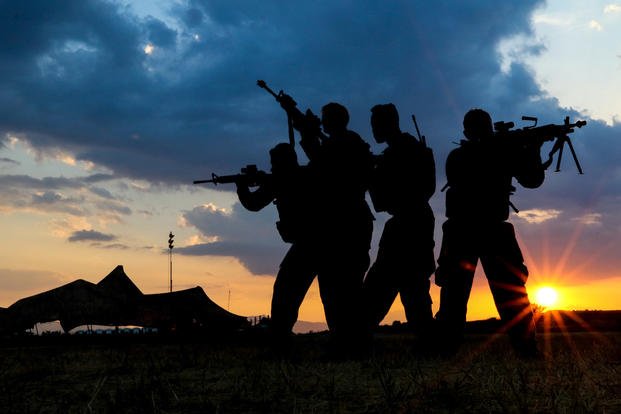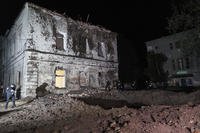As an Amazon Associate, Military.com earns from qualifying purchases
Editor's note: The following is an excerpt from "The Unit: My Life Fighting Terrorists as One of America's Most Secret Military Operatives" by Adam Gamal with Kelly Kennedy.
In January 2006, we landed in an airfield in East Africa. We had fixers there who would meet us with SUVs and equipment. We were tracking al-Qaeda East Africa and al-Shabaab, which is affiliated with al-Qaeda East Africa.
My wife didn't know where I was, and that was, as usual, tough on her. So for this trip, she decided to take our daughter to Egypt to visit her parents. She had been working, earning her master's degree, and taking care of our daughter while I was gone. She definitely did not know what I was up to.
In Africa, a couple of thousand miles away from her, six of us emerged from a helicopter: two from my unit, two Navy SEALs, and two civilian guys from other agencies.
One of them was wearing sandals.
"Jack, you're seriously going to wear sandals into a shithole country?" we teased. "Sandals?"
"I'm just relaxed," he said.
"Dude, you need to wear shoes," I said.
"Why?" he said. "It's fucking hot."
"Because you can't run in sandals," I said.
"Run from what?" He seriously seemed to think he was on vacation.
We were supposed to land in the airfield and go directly into town. But our equipment in the field hadn't been serviced for a while.
"Let's just wait here while we take care of it," I said, "and then we'll move to our next location."
By the grace of God.
As we worked on the equipment, our fixers showed up and burst out of their vehicles.
"You guys need to leave now," they said. "Right now."
I'd never seen them look so nervous. Al-Shabaab-Aden Ayro's group had set up an ambush and planned to attack us on our way into town. When we hadn't moved, they assumed we were going to stay at the airfield, so they had stormed a couple of checkpoints and were on their way to kill us.
Even as our guys told us the news, al-Shabaab barreled down dusty roads toward us, weapons bared in the back of white pickup trucks.
Our pilot spoke the local language, but he was about as calm as they come.
"You guys need to get on the aircraft right now," he said. "Right now."
We were within five minutes, tops, of being captured or killed -- all of us.
Our commo guy was so unorganized. He kept dropping shit as he ran. Stop. Pick it up. Run. Stop. Pick it up. Run.
Sensitive items they needed to make it to the bird. Jack's sandals slowed him down.
"Move!" I yelled.
"Go! Go! Go!" the pilot yelled. We half handed, half dragged people into the aircraft.
"We're in," we all yelled at once.
He took off with the door still open and the tiny stairwell still down. We were still trying to get to our seats.
We were fucking terrified.
As we started to take off, we could see new pickups loaded with weapons heading toward us.
Me and the three other military guys pulled out broken-down M4 semiautomatic carbines and calmly put them back together. We were ready, but we didn't have enough ammo to take out the militia. And we could only do so much from the air. We absolutely would not risk another Black Hawk Down.
We didn't have to use them.
When we had reached a safe distance, the military guys calmly broke down their M4s and hid them.
"Hey, Jack," we said. "You never saw that."
"Got it," he said. "Glad you guys had it."
"And next time?" I asked.
"Right," he said. "Shoes."
We did not write about the M4s in the report. We maintained that we had only pistols because if the State Department had found out, it would have been an issue. But we weren't stupid.
The local guys who helped us remained on the airfield, and as we looked out, we watched their firefight, just as worried for them as we were for ourselves. We hoped they had enough firepower. We found out later that a couple of the guys had been killed. One lost an eye -- we saw him about a week later, on another bad day. They had cleaned him up and then replaced his eye with a cow's eye.
I don't think anyone intentionally ratted us out that day. I think the locals grew complacent. They figured nothing would ever happen to us. So, when they knew we were coming, they'd throw a feast for us for lunch, and it didn't take a genius to figure out that when one of the guys went and bought all the food in the market, we were on our way.
And al-Shabaab probably saw the aircraft before we landed. Later, we learned communications had been intercepted that said, "The white pigs have landed." In Islamic culture, pigs are considered impure. I might be impure, but if you're going to call me a pig, at least call me a brown pig.
I talked to the team about switching things up after that so we wouldn't be such obvious targets. We knew they were after us.
We arranged to meet the guys again to continue our work. We needed to keep looking for the terrorists who had received safe haven after the 1998 embassy bombings.
The airfield attack had been on a Saturday.
Later that week, a woman reached out to one of our linguists and asked if he would meet her for dinner because she said she needed some help. The woman knew the linguist's sister back home in the United States, who knew her brother worked at the embassy, but she didn't know what he did there.
In any case, our linguist met the woman for dinner on a Tuesday.
She allegedly told him her husband's bank accounts had been frozen. The woman gave him a phone number for her husband and said, "He'd like to talk with someone from the embassy."
But as she told her story, the linguist freaked out because he realized her husband was possibly
involved in the same terrorist activities we were investigating. Our linguist was solid -- great
guy.
He was so upset about what she told him that he went straight from the dinner to my house to tell me.
"Hey," I said, "were you followed?"
He didn't think he was.
Thursday morning, we went out on another mission. Because of the airfield incident, we changed the time, as well as a few other things, to make it less predictable. In and out.
That evening or the next morning, we left for another mission at four o'clock. We got up at about one, and we hadn't slept all day because we had the earlier daytime mission. We completed the second mission, we came back, we cleaned our gear, and then we went back to our houses. My housemate was also my teammate from my unit. Hell of a guy. He and I relaxed for a bit and watched TV. Later that day, I went out on my own to get something to eat. My compound had maybe ten houses in it.
When I came back from dinner, our gate guard opened the door for me to let me back in. Then I drove to my house. When I got out of my car, there were three guys behind me.
I heard a gunshot.
I realized I couldn't capture all of the men, but I grabbed one, and we fought for three or four minutes. Everything happened so fast, but even as we struggled, I wondered if they had followed the linguist the night he had dinner with the terrorist's wife.
Had it been a setup?
The other two guys grabbed at my arms and pulled the first guy free.
They ran. The gate guard was nowhere to be seen.
I stood alone in the cold, dark parking lot. I put my hand on my stomach.
It was wet.
Fucking brilliant, I thought. I got shot.
From "The Unit: My Life Fighting Terrorists as One of America's Most Secret Military Operatives" by Adam Gamal with Kelly Kennedy. Copyright 2024 by the author and reprinted by permission of St. Martin's Press.
Adam Gamal is a pseudonym created to keep the author's family and himself safe from harm. Gamal served in the most elite units in the U.S. Army, and after a dozen deployments, he retired in 2016. His awards include the Bronze Star Medal, the Purple Heart and the Legion of Merit. He is currently an international consultant for a security organization.
Kelly Kennedy served as a soldier in Desert Storm and Mogadishu, Somalia. She has written for USA Today, The New York Times, The Salt Lake Tribune, The Portland Oregonian, The Chicago Tribune and Army Times, and is the managing editor of The War Horse, a nonprofit newsroom dedicated to coverage of veterans and military issues. She is the author of "They Fought for Each Other: The Triumph and Tragedy of the Hardest Hit Unit in Iraq," the co-author, with Pete Lapp, of "Queen of Cuba: An FBI Agent's Insider Account of the Spy Who Evaded Detection for 17 Years," and with Kate Germano, of "Fight Like a Girl: The Truth Behind How Female Marines are Trained." She lives in Washington, D.C.









